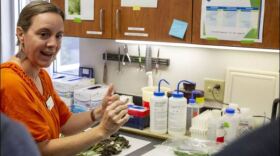-
You’ve bought the turkey. You’ve prepped the brine. You’ve maybe even baked and frozen the pies. You’re ready for Thanksgiving dinner. But have you thought about being prepared for leftovers?
-
With Florida’s citrus industry declining, it’s important for growers to have robust backup crops to prevent financial loss. Dr. Zhanao Deng and his team with the University of Florida are decoding blackberry DNA to help Floridian growers.
-
The University of Florida’s Plant Diagnostic Center recently received significant acknowledgement as the first university-based lab in the nation to earn accreditation from the National Plant Diagnostic Network.
-
As National Honey Bee Day approaches this Saturday, beekeepers are celebrating the buzzing pollinators that support our food supply, as well as the success of a University of Florida accelerator that elevated bee-based small businesses.
-
Florida experts break down the buzz on the myth of mosquito-repelling plants.
-
About 70% of the world’s crop production relies on pollinator insects for survival.That makes it helpful to know how many pollinators are out there. As a citizen scientist, you can participate in this year’s Great Southeast Pollinator Census.Agents with the University of Florida Institute of Food and Agricultural Sciences (UF/IFAS) Extension are looking for volunteers to count pollinators. The census is a regional event that includes Florida, Alabama, Georgia, North Carolina and South Carolina.
-
Boasting more than 80 distinct ecosystems, Florida is a biodiversity hot spot. More than 4,000 animal species, in fact, are native to the Sunshine State.As the weather continues to warm, a growing number of species are on the move, meaning interactions with humans are increasingly common.
-
Florida is home to more than 500 nonnative species, more than 50 of which are reptiles. Current monitoring techniques depend on visual surveys by scientists, and this is far from an exact science because reptiles — particularly snakes — are extremely elusive. A new technique being developed by scientists at University of Florida's Institute of Food and Agricultural Sciences (UF/IFAS) can identify DNA traces of Burmese pythons — as well as northern African pythons, boa constrictors, and rainbow boas — weeks after they have left an area using soil or water samples.
-
Sandwiched between International Compost Week in early May and National Composting Day on May 29, a new initiative with the University of Florida is taking shape as cities across the nation embrace composting as a sustainable solution to food waste.
-
Lipman Family Farms wanted to mitigate flood risk associated with heavy rain on their 2,000-acre farm in Naples.As general manager, Lucas Conran helps oversee seven farming operations for Lipman in Florida and other states along the East Coast. So, he asked for help from his longtime friend, Sanjay Shukla, a University of Florida hydrologist, who had just developed his “compact-bed geometry,” with state and federal funding, including the U.S. Department of Agriculture.
Play Live Radio
Next Up:
0:00
0:00
Available On Air Stations










